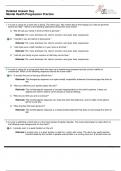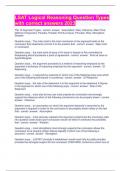,Niek Kooren 559855
A - Strategies for retention
Part one
Does distributed study lead to better long-term retention than massed study? How
generalizable is this effect (population/setting/materials)? And what is the explanation?
Rereading Effects Depend on Time of Test – Rawson & Kintsch
Abstract: Previous research has shown better text learning after rereading versus 1 reading of
a text. However, rereading effects have only been explored using immediate tests, whereas
most students face delays between study and test. In 2 experiments, 423 college students read
a text once, twice in massed fashion, or twice with 1 week between trials. Students were
tested either immediately or 2 days after study. On an immediate test, performance was
greater after massed versus single reading, whereas performance for distributed rereading was
not significantly greater than after single reading. On a delayed test, performance was greater
after distributed versus single reading, whereas performance for massed rereading and single
reading no longer differed significantly.
Experiment 1:
In Experiment 1, readers studied a lengthy
expository text either once, twice in massed
fashion, or twice with a 1-week delay between
study trials. Half of the readers were tested
immediately after the final study trial (i.e., after
the first study trial for those who only read once
and after the second study trial for those who
reread the text), and half of the readers were
tested after a 2-day delay.
Participants and design. Participants were 235
undergraduates from University of Colorado who participated to partially satisfy a course
requirement in an introductory psychology class, which primarily consisted of freshman and
sophomore students.
Summary. On an immediate test, performance was
greater after massed rereading than after distributed
rereading or a single reading, which did not differ
from one another. In contrast, on a delayed test,
performance was greater after distributed rereading
than after massed rereading or a single reading,
which did not differ from one another. The shift in
the overall pattern from immediate to delayed
testing was primarily due to the fact that learning
with distributed rereading was durable and did not
differ with test delay, whereas learning with massed
rereading was more fragile and dropped sharply
with test delay.
Experiment 2:
, Niek Kooren 559855
Findings suggest that the advantage of massed
rereading on the immediate test may have been due
to greater emphasis on encoding and recall of lower-
level text content. To explore the hypothesis that the
interaction of time of restudy and time of test was
due to differential emphasis on encoding and recall
of content at different levels (hereafter referred to as
the levels hypothesis), the text used in Experiment 2
included target sentences that were designed to
primarily contain either main ideas, important details,
or unimportant details.
Participants and design. The participants were 168
undergraduates from University of Colorado who
participated to partially satisfy a course requirement in introductory psychology. Participants
were randomly assigned to six experimental groups defined by the factorial combination of
two independent variables: study (single, massed, or distributed) and test (immediate or 2-day
delay).
Summary. The most important outcomes of Experiment 2 concern the replication of the main
findings from Experiment 1. Using different text material, we again found that rereading
effects depended on time of test. Performance on the immediate test was greater after massed
rereading than after a single reading. However, performance was no longer significantly
greater after massed rereading on the delayed test. Distributed rereading showed the opposite
pattern. Performance on the immediate test did not significantly differ after distributed
rereading versus a single reading, whereas performance on the delayed test was greater after
distributed rereading than after a single reading. As in Experiment 1, the shift in the overall
pattern from immediate to delayed testing was due primarily to a drop in performance with
massed rereading and relatively minimal differences in performance with distributed
rereading. One account of this pattern, the levels hypothesis, was not supported by the results
of secondary analyses.
Distributed Rereading Effects: Reconciling with Previous Research
Text length may influence the relative amount of time spent studying the text with massed
versus distributed rereading.
Some suggested that the processing difference for shorter versus longer texts was “general
rather than local . . . one possibility is that the integration of related facts may be more
difficult for longer than for shorter texts”.




